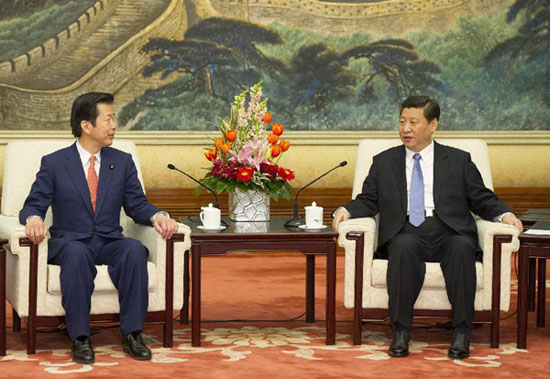
 |
| Xi Jinping (R), general secretary of the Central Committee of the Communist Party of China, meets with Natsuo Yamaguchi, leader of the New Komeito party, one of Japan's two ruling parties, at the Great Hall of the People in Beijing, capital of China, Jan. 25, 2013. (Xinhua/Huang Jingwen) |
Key Words:Sino-Japanese ties ; Diaoyu Island ; Xi Jinping ; Natsuo Yamaguchi
Related Reading:
>> China's Xi meets Japanese ruling party leader
>> More visits bring opportunities to Sino-Japanese ties
>> US' dangerous stance
>> Detailed survey of China's islands to be conducted
BEIJING, Jan. 25 (Xinhua) -- China and Japan should address "sensitive" issues effectively and in a timely manner, Xi Jinping said Friday. Bilateral relations soured amid Japan's move to "purchase" part of the Diaoyu Islands last year.
Xi, general secretary of the Communist Party of China (CPC) Central Committee, made the remarks as he met with Natsuo Yamaguchi, leader of the New Komeito party. The New Komeito party is the smaller of Japan's two ruling parties.
"China's stance on the Diaoyu Islands is consistent and clear," Xi said, urging the Japanese side to respect history as well as reality and make joint efforts with China to seek effective methods for appropriately controlling and resolving problems through dialogue and consultation.
"Only by using history as a mirror can one look into the future," Xi said, adding that the Japanese side should respect the feelings of the Chinese people and appropriately address historical issues.
The Chinese leader said both sides should keep the overall situation in mind and stick to the proper path for advancing the China-Japan relationship in a sustained, healthy and stable way.
Yamaguchi, who arrived in Beijing on Tuesday, is the first senior member of Japan's ruling bloc to travel to China since the Japanese government decided to "purchase" the Diaoyu Islands in September, a move that damaged bilateral relations.
Xi said the Chinese side attaches importance to Yamaguchi's visit, as bilateral ties are facing an "unusual" situation, adding that he hopes the New Komeito party will continue to play a constructive role in the development of the bilateral relationship.
The "unprecedented" cooperation seen during the four decades following the normalization of diplomatic relations has strongly driven both countries' development, Xi said, adding that China remains committed to developing its ties with Japan.
Xi called on the two nations to continue to honor the "four political documents," which have served as "a ballast stone" for stabilizing bilateral relations.
The documents -- the China-Japan Joint Statement on Comprehensively Advancing Strategic and Reciprocal Relations, the Sino-Japanese Joint Statement, the China-Japan Treaty of Peace and Friendship and the Sino-Japanese Joint Declaration -- were signed by the two sides in 1972, 1978, 1998 and 2008, respectively.
"Under the new circumstances, we should shoulder national and historical responsibilities as well as display political wisdom, just like the elder generations of leaders of the two countries, to overcome difficulties and advance China-Japan relations," said the Chinese leader.
Yamaguchi said the New Komeito party is committed to expanding the friendship between the two nations and holds that both sides should follow the principles established in the "four political documents."
As a party of Japan's ruling coalition, the New Komeito party will carry forward the traditional friendship and work to facilitate exchanges and cooperation between the two countries, with an aim of appropriately resolving problems through dialogue, said the Japanese party leader.
During the meeting, Yamaguchi delivered a letter to Xi from Japanese Prime Minister Shinzo Abe.
In his letter, Abe wrote that the relationship between Japan and China was among the most important bilateral relationships. He also wrote that the two countries shared the common responsibility of peace and development in the Asia-Pacific region, as well as the world at large.
According to the letter, Abe is willing to pursue ties with China while looking at the big picture and advancing the strategic, mutually beneficial relationship between the two countries.
















 Photo story: The art of food, the art of life
Photo story: The art of food, the art of life


![]()
